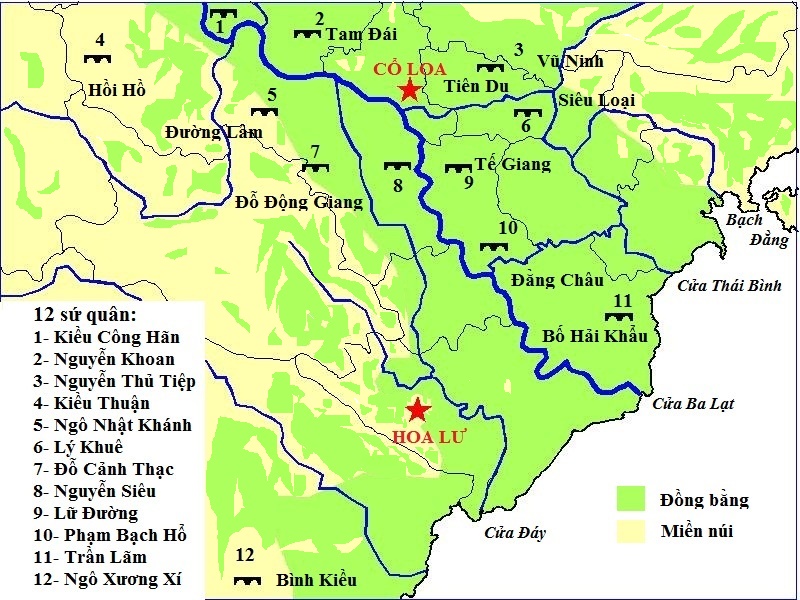Đỗ Cảnh Thạc on:
[Wikipedia]
[Google]
[Amazon]
 ƒê·ªó C·∫£nh Th·∫°c ( vi-hantu, ÊùúÊôØÁ¢©, 912–967), formally Duke C·∫£nh (ÊôØÂÖ¨), was a
ƒê·ªó C·∫£nh Th·∫°c ( vi-hantu, ÊùúÊôØÁ¢©, 912–967), formally Duke C·∫£nh (ÊôØÂÖ¨), was a
 ƒê·ªó C·∫£nh Th·∫°c ( vi-hantu, ÊùúÊôØÁ¢©, 912–967), formally Duke C·∫£nh (ÊôØÂÖ¨), was a
ƒê·ªó C·∫£nh Th·∫°c ( vi-hantu, ÊùúÊôØÁ¢©, 912–967), formally Duke C·∫£nh (ÊôØÂÖ¨), was a warlord
Warlords are individuals who exercise military, Economy, economic, and Politics, political control over a region, often one State collapse, without a strong central or national government, typically through informal control over Militia, local ...
of Vietnam
Vietnam, officially the Socialist Republic of Vietnam (SRV), is a country at the eastern edge of mainland Southeast Asia, with an area of about and a population of over 100 million, making it the world's List of countries and depende ...
during the Period of the 12 Warlords.
Đỗ Cảnh Thạc was a Chinese from Guangling (in modern Yangzhou
Yangzhou is a prefecture-level city in central Jiangsu Province, East China. Sitting on the north bank of the Yangtze, it borders the provincial capital Nanjing to the southwest, Huai'an to the north, Yancheng to the northeast, Taizhou, Jiangsu, ...
, Jiangsu Province
Jiangsu is a coastal province in East China. It is one of the leading provinces in finance, education, technology, and tourism, with its capital in Nanjing. Jiangsu is the third smallest, but the fifth most populous, with a population of 84. ...
). In 905, he was sent to put down the rebellion of Đường, Nguyễn together with Ngô Xương Văn and Dương Cát Lợi. Ngô Xương Văn was the second son of the former ruler Ngô Quyền
Ngô Quyền ( vi-hantu, 吳權) (April 17, 898 – February 14, 944), often referred to as Tiền Ngô Vương (前吳王; "First King of Ngô"), was a warlord who later became the founding king of the Ngô dynasty of Vietnam. He reigned fro ...
. When their troops reached Từ Liêm, Văn persuaded his two colleagues to turn their armies back, and dethroned the usurper Dương Tam Kha
D∆∞∆°ng Tam Kha (wikt:Ê•ä, Ê•äwikt:‰∏â, ‰∏âwikt:Âì•, Âì•), formally King B√¨nh of D∆∞∆°ng (wikt:Ê•ä, Ê•äwikt:Âπ≥, Âπ≥wikt:Áéã, Áéã), later known as the Duke of Ch∆∞∆°ng D∆∞∆°ng (Á´ÝÈôΩÂÖ¨) (died 10 August 980), was king of the Ng√¥ dynasty from 9 ...
.
After Ngô Xương Văn's death, Thạc occupied Đỗ Động Giang (modern Thanh Oai District, Hanoi
Hanoi ( ; ; ) is the Capital city, capital and List of cities in Vietnam, second-most populous city of Vietnam. The name "Hanoi" translates to "inside the river" (Hanoi is bordered by the Red River (Asia), Red and Black River (Asia), Black Riv ...
), and titled himself ƒê·ªó C·∫£nh C√¥ng (ÊùúÊôØÂÖ¨).'' Vi·ªát Nam s·ª≠ l∆∞·ª£c'', Quy·ªÉn 1, Ph·∫ßn 3, Ch∆∞∆°ng 1''ƒê·∫°i Vi·ªát s·ª≠ k√Ω to√Ýn th∆∞
The ''ƒê·∫°i Vi·ªát s·ª≠ k√Ω to√Ýn th∆∞'' ( vi-hantu, §ßË∂äÂè≤Ë®òÂÖ®Êõ∏; ; ''Complete Annals of ƒê·∫°i Vi·ªát'') is the official national chronicle of the ƒê·∫°i Vi·ªát, that was originally compiled by the royal historian Ng√¥ Sƒ© Li√™n under ...
'', Peripheral Records vol. 5 Later, he was defeated by Đinh Bộ Lĩnh
ƒêinh B·ªô Lƒ©nh (924‚Äì979; ), real name allegedly ƒêinh Ho√Ýn ( ‰∏Å Ê°ì), was the founding emperor of the short-lived ƒêinh dynasty of Vietnam, after declaring its independence from the Chinese Southern Han dynasty. He was a significant figur ...
.
References
912 births 967 deaths 10th-century Vietnamese people People from Hanoi Vietnamese people of Chinese descent Anarchy of the 12 Warlords {{Vietnam-stub